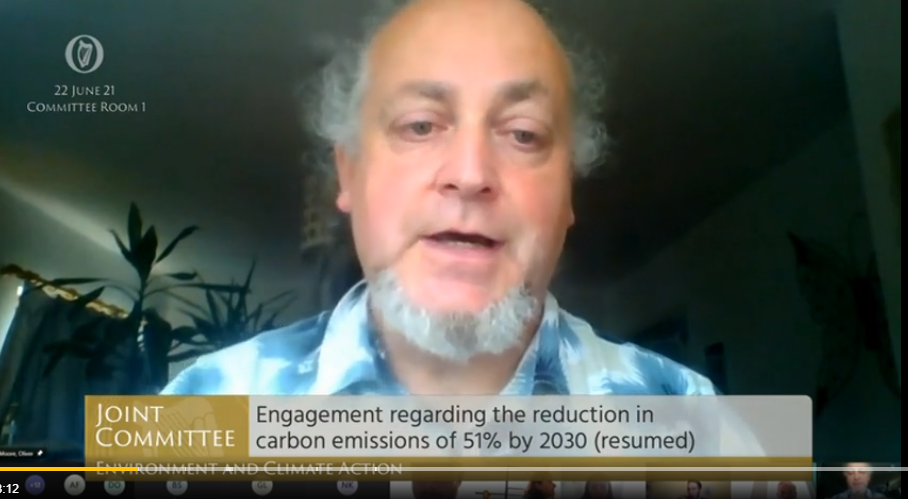ARC2020’s Oliver Moore spoke to JOCECA – the Joint Oireachtas Committee on Environment and Climate Action – a Committee in the Irish Parliament. This comes just as the CAP trilogues start to finish, and as the Irish Parliament (Dáil) approves an ambitious Climate Bill which aims for 50% reduction in emissions by 2030. Below is a transcript of what he said. A longer version of an accompanying paper is also in the article.
I’m Dr. Oliver Moore of the Centre for Co-operative Studies in University College Cork and ARC2020, a European think tank on agri-food policy matters. Thanks for the opportunity to speak today. My focus is on three areas with the potential to significantly impact climate change mitigation, adaptation, biodiversity and indeed other public goods. These are organic farming, eco-schemes and scrub/agroforestry. What is presented here today orally is a shortened version of a longer, fully referenced submission, please refer to this for more substantial considerations and evidence.
Full 10 page accompanying submission Dr. Oliver Moore UCC Submission document JOCECA
Organics
Organic can be described as a brilliant all-rounder in the delivery of public goods. The latest organic regulation states that “organic production is an overall system of farm management and food production that combines best environmental and climate action practices, a high level of biodiversity, the preservation of natural resources and the application of high animal welfare standards.”
Research shows enhanced environmental benefits in the areas of biodiversity, landscape, soil, ground and surface water, climate and air, energy and reduced exposure to pesticides for workers and consumers.
There is little Irish research into organics and sustainability, but I would draw the Committee’s attention to organic farming’s positive performance in a series of publications by Drs Eileen Power and Jane Stout of TCD on biodiversity.
Research suggests organic farms can be more viable; provide 10-20% more employment per ha; provide women an easier entry-point into farming; and have a younger age base. Organic can thus synergise coherently with Our Rural Future.
Ireland suits organic due to our clean green image, the length of our grazing season, and the fact that we are agri-food exporter to EU markets that increasingly want it. Looking forward, organic is well positioned regarding the carbon budget, an EU carbon border adjustment mechanism, tightening EU rules on animal welfare, pesticides and more.
However the reality is that organic farm viability needs to be further supported. There are, with sheepmeat and to a lesser extent beef, price pressures and leakage into the conventional sector. There is the lack of an economy of scale with a diffuse spread of farmers around Ireland, and a well below EU average payment rate.
Ireland has one of the lowest shares of organic farmland in the whole of the EU. Ireland has an organic action plan, but it is both unambitious and is likely to fail to significantly grow the sector.
New data sourced this month by this witness shows that the Department of Agriculture dedicates about E15 million of E1.8 Billion budget to organic farming directly. Bord Bia dedicates about 2% of its budget to organic food promotion. In a context of a 5% (2020) or 7.5% (2030) target for organic Utlisible Land Area (UAA), this is clearly far too low.
Supports are however emerging via the EU Organic Action Plan. These include, in particular, supports for marketing and for Research and Development. Horizon Europe’s “Agriculture, Forestry and Rural Areas” intervention will dedicate at least 30% of funds to “topics specific to or relevant for the organic sector.”
There is a need for a comprehensive full agri-food system approach to developing organics at policy, production, research, extension services, processing, distribution, advocacy and consumption ends. These must be done simultaneously and publicly, so as to develop confidence in the sector. This should be coupled with the levelling of the playing field by fully complying with EU and national environmental law and targets in water quality, reducing absolute emissions, and more.
A comprehensive new Organic Action Plan is needed. There are a range of recommendations in the longer submission, below are some highlights.
- Far higher payment rates of about E500 per hectare for grassland systems, and proportionally more for arable (E600) and horticulture (E700), or priority access to other agri-environmental schemes. (payment rates around Europe are typically far higher than in Ireland, see from page 22 Payment_rates_EU-Organic ed.)
- Scoring prioritisation for direct selling producers for entry to Organic Farming Scheme.
- Immediate progress towards 7.5% of Bord Bia and 7.5% of Department of Agriculture budgets for organics, with 7.5% achieved by 2026.
- Establishment of organic advocacy organisation, with initial funding of E150,000 per year.
- Trial EIP for conversion to organic using blockchain technology to achieve group organic certification as per the new organic regulation. Roll out of this approach on a regional basis by 2026. Market blockchain alignment thereafter.
- Mandated, ring fenced and rising levels of organic public procurement with no conflation with Bord Bia Quality Assured, as has happened previously
Can it be done? Yes. Irish authorities need to learn from best practices from Austria, Denmark, France (esp Brittany and Normandy), as detailed in the longer submission.
Eco-schemes
Eco-schemes is the second of three policy interventions proposed. Eco-schemes will be an integral part Ireland’s CAP Strategic Plan.
The Department appears likely to use the following broad categories:
- Climate Change Mitigation and Adaptation
- Sustainable and Efficient Management of Natural Resources
- Biodiversity and enhanced ecosystem services
- Animal Health and Welfare
A points-based system will be used to give farmers flexibility while also rewarding those who are doing more for the environment. This needs to be transparent, monitoring and evaluation needs to be clear, consistent and coherent, and the relationship between conditionality, pillar two and the rest of CAP needs to be clear and consistent too – eco-schemes must go beyond conditionality and must respect the no backsliding principle. In other words, clearing scrub for birdboxes on poles shouldn’t happen.
Recommendations here are for measures that
- Encourage the verifiable reduction in, and/or work without, the use of fertilizer and pesticides;
- Prioritise high nature value habitats;
- Increase riparian zones and careful catch crop integration
- Enhance and widen the definition of existing habitats to include ponds, wet grasslands, wetlands and wet flushes.
- Retaining winter stubble on arable land
- While animal welfare and precision farming are not suitable for eco-schemes.
As a related point – in light of the recommendations from the European Court of Auditors yesterday, which lists as one of just three recommendations to “Take steps to reduce emissions from cultivated drained organic soils” I would like to emphasise GAEC 2 Preservation of carbon rich soils such as peatlands and wetlands – this has the single most potential to deliver on climate targets within CAP. To support this, creative use of eco-schemes should be made for farmers in these lands to help with their income, while the designation should remain agricultural.
Trees on Farms
Finally, we also need a new approach to scrub and a new agroforestry scheme. There are promising signs that the new CAP will allow a proportion of land to have scrub and still count as an eligible acre. This could add 55,000 eligible hectares in the next CAP. Carefully managed, this could lead to native forestry regeneration.
Ireland’s Agroforestry Scheme needs to be lengthened and broadened. Currently it provides support for just five years. For trees, 10 to 15 years is optimal. The replanting obligation of the Forestry Act needs to be relaxed so that farmers can be encouraged to try agroforestry without being locked into trees forever on their land. Alley cropping and forest farming should also be encouraged in the Scheme. The Joint Environmental Pillar, Stop Climate Chaos and SWAN agri-food policy document has more on the development of a full suite of agroforestry measures.
Conclusion

Real, comprehensive support for the organic sector, ambitious immediately impactful eco-schemes, and a new attitude to scrub and tree integration into farmlands, are three clear ways we can soberly face into the rapidly emerging climate and biodiversity collapses happening all around us. Farming has its role to play – now – in a real and just transition. These are three ways it can help us to do so.
More on Ireland
Hidden Formulas and Agri-Media – Can we Find a Fair CAP in Ireland?
Walk Out – Environmental Pillar Rejects Irish State’s Agri Plan
Latest on CAP
Withdraw The CAP Movement Takes on Timmermans, Trilogues and Parliament Plenary
EU Green Deal | Good Food Good Farming Campaign To Get Citizens On Board






1 Trackback / Pingback
Comments are closed.